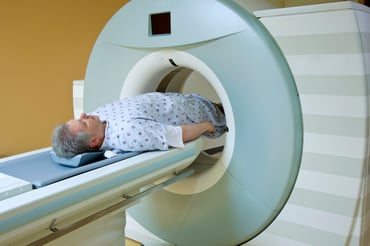
Prostate cancer is the most common type of cancer among men. Thankfully it can be very effectively treated, especially when found early. One of the primary treatments for prostate cancer is radiation therapy. There are other prostate cancer treatments available. The right choice for you will depend on how far the cancer had progressed when it was found, as well as your overall health condition.
Read on to find out what every man should know about radiation therapy for prostate cancer and what you might expect during the treatment process.
What is Prostate Cancer?
Prostate cancer is a disease in which malignant (cancer) cells form in the tissues of the prostate. For the most part, this is a slow-growing type of cancer that stays within the prostate for a long time before moving outside the capsule and into nearby organs.
Symptoms are not noticeable until the cancer has been growing for a long time. This is why prostate cancer screening is really important for men over the age of 50. Your doctor will monitor your PSA levels with a blood test, and perform an exam about once a year to see if anything has changed. If your PSA (prostate specific antigen) levels go up all of a sudden or they’re steadily getting higher every year, a biopsy may be recommended to determine if cancer is present. If the doctor notices anything unusual during a prostate exam they may also recommend more testing.
How Does the Doctor Choose the Best Prostate Cancer Treatment for Each Patient?
Because prostate cancer is usually slow-growing it’s possible to wait until the cancer has progressed further before starting treatment. Your oncologist may recommend a “watchful waiting” approach, checking your PSA levels and other tests once every 6 months to a year. Based on the results of those tests, treatment may be recommended.
When the time comes for prostate cancer treatment, there are several types including surgery to remove the prostate, hormone therapy, and radiation therapy. Radiation therapy is a highly effective treatment option for many men while preserving the prostate and avoiding the side effects of hormone therapy.
There are several types of radiation therapy that can be used for prostate cancer treatment. For many men, a combination of more than one therapy works best. This process is called ProstRcision.
External Beam Radiation, Brachytherapy, or Both?
Radiation therapy for prostate cancer falls into one of three categories: external beam radiation therapy (EBRT), brachytherapy (internal or “seed implant” radiation), and a combination of both called ProstRcision. Each has its pros and cons, so it's best to ask your physician about what is available in your area, as well as which option might be best suited to you.
External beam radiation therapy (EBRT) is done with a linear accelerator that precisely delivers radiation to the cancer inside the prostate. The prostate is located near other important organs such as the rectum and bladder, so careful attention is paid to be sure the radiation beams have as little effect as possible on nearby healthy tissue.
Like EBRT, brachytherapy (internal or implant radiation) delivers precise radiation only to your prostate. However, instead of coming from a linear accelerator, it's delivered from within your body. Several small radioactive “seeds” are surgically implanted into the prostate. They break down slowly over time, killing the cancer cells in the prostate.
ProstRcision is a third option for treating prostate cancer. Patients receiving ProstRcision receive both external beam and internal radiation therapy. The timing of each is determined by the radiation oncologist in charge of your treatment plan.
Is ProstRcision Proven to Be Effective?
While every situation is unique, ProstRcision is highly successful in curing prostate cancer. With over 25 years of data, there is a database showing consistently high cure rates over 15 years. Learn more about cure rates and what they mean for you.
If you are considering radiation therapy as an option for prostate cancer treatment and live in the Atlanta area, schedule an appointment with one of the radiation oncologists at our locations in Conyers, Covington, Decatur, and Snellville.
What to Expect During ProstRcision
The process itself is a two-step process. The first is to place radioactive seeds with a short outpatient surgical procedure. Once complete you’ll be scheduled for external beam radiation therapy. These sessions will be daily for several weeks, with breaks on the weekend.
The radiation oncologist will monitor you carefully and run tests to determine if the cancer is responding as expected.
Side Effects of Radiation Therapy
A common side effect of external beam radiation therapy for prostate cancer is bowel irregularities. Many men notice their bowel movements have become more frequent or that they are in pain when having a bowel movement. If you experience severe cramping, bloating or diarrhea, call your doctor.
Another common side effect of radiation therapy is fatigue. Your body will work harder to repair your cells, so you will likely feel exhausted after treatment. You may also notice that your immune system is compromised and more susceptible to colds and other illnesses.
The internal radiation therapy may come with some other side effects such as difficulty urinating, pain while urinating, or feeling the need to urinate often. It can also cause erectile dysfunction and blood in the urine.
Most side effects are much less noticeable or completely disappear after treatment is complete. Keep an open line of communication between you and your radiation oncology team who can help you minimize side effects if they know what you’re experiencing.
Choosing a Radiation Oncologist for Prostate Cancer Treatment
If you or someone you know received a prostate cancer diagnosis a radiation oncologist is often the physician you will see next. Talk with them about possible treatment options that can help you avoid surgery and the side effects of prostate removal.
Request an appointment at a location that’s convenient for you in the Atlanta area.





